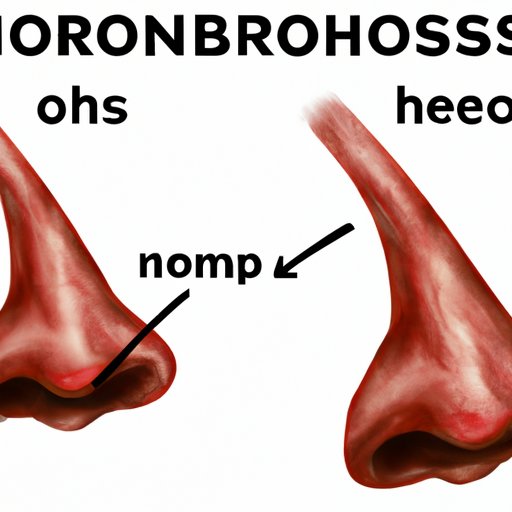
Introduction:
Have you ever experienced random nosebleeds, leaving you worried and helpless? Nosebleeds, also known as epistaxis, can happen to anyone and are common occurrences. They occur when the tiny blood vessels in the nose break and bleed. Although nosebleeds are usually harmless, they can be frustrating and hard to deal with. This article aims to provide you with a comprehensive guide on how to stop nosebleeds and prevent them from occurring in the future.
Understanding the root causes of nosebleeds and what you can do to prevent them
The most common cause of nosebleeds is dryness, especially in areas with low humidity. Other factors that can cause nosebleeds include trauma, high blood pressure, blood-thinning medications, allergies, and infections. One of the best ways to prevent nosebleeds is to keep the nasal passages moist. You can achieve this by using a humidifier, avoiding picking your nose, and applying a lubricating ointment or spray inside your nostrils.
Step-by-step guide to stopping a nosebleed at home using readily available items
If you experience a nosebleed, it is essential to act quickly to stop the bleeding. The first step is to sit down and lean your head forward to prevent blood from flowing down the back of your throat. Pinch the soft part of your nose for at least ten minutes to apply pressure to the bleeding area. You can also apply ice to the bridge of your nose or use saline sprays to help constrict the blood vessels and stop the bleeding.
When to seek medical attention for nosebleeds and how they may be treated
If the bleeding doesn’t stop after 20 minutes of pressure, or if it’s severe and rapid, it’s important to seek medical attention. Your healthcare provider may use either cauterization or nasal packing to stop the bleeding. Cauterization is a quick procedure that involves using a special tool to burn or seal the blood vessels to stop the bleeding. Nasal packing involves placing a special gauze or balloon in your nose to apply pressure to the bleeding vessels.
Natural remedies for nosebleeds that you can use at home
If you prefer natural remedies to stop nosebleeds, several remedies are effective. You can use essential oils, such as lavender and peppermint oils, that have anti-inflammatory and antiseptic properties. Vitamin E oil can also be applied to the inside of your nostrils to moisturize and prevent dryness.
Foods that can help prevent nosebleeds from occurring
Adding foods rich in vitamin K to your diet can help prevent nosebleeds. Vitamin K is essential for healthy blood clotting and can be found in foods like kale, spinach, and broccoli, as well as in fermented foods like sauerkraut and pickles.
Tips for keeping the inside of your nose moist to avoid dryness and nosebleeds
To keep the inside of your nose moist, you can use saline sprays or rinses to provide hydration. Drinking plenty of water can also help hydrate the nasal passages and prevent dryness. It is also essential to avoid blowing your nose too hard or too frequently, as this can cause irritation and dryness.
How to manage anxiety-induced nosebleeds and when to seek professional help
Anxiety and stress can trigger nosebleeds. To manage anxiety-induced nosebleeds, practicing stress-reduction techniques like breathing exercises, meditation, and yoga can help prevent nosebleeds. It is important to seek professional help if anxiety is a chronic issue and is causing severe nosebleeds.
Conclusion
Nosebleeds can be unnerving but are rarely dangerous. Understanding the root causes of nosebleeds and implementing prevention methods can help you prevent nosebleeds from occurring in the first place. If you start to experience nosebleeds, it is important to take action quickly to stop the bleeding and seek medical attention if necessary. By following the tips in this article, you can prevent nosebleeds and manage them effectively if they do occur.




